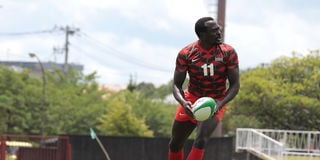Olympic men's rugby sevens - six players to watch

Kenya sevens rugby legend Collins Injera during a training session at the Fukuoka Prefecture Kurume Sports Centre on July 13, 2021 ahead of the Olympic Games.
What you need to know:
- Tuwai, a livewire playmaker who made his sevens debut in 2014, is key Fiji with his awareness and all-round linking game
- Ball in hand, Isles possesses a deadly step and turn of pace that can turn deep defence into try-scoring attack in a blink of an eye
- Norton is one of the stalwarts of the rugby sevens scene, having made his debut for England back in 2009
Tokyo
Fiji will get their title defence of the men's rugby sevens under way at the Tokyo Olympics on Monday.
Here, AFP Sport looks at six key players to watch:
Jerry Tuwai - Fiji
Cross-code star Semi Radradra might be the name with which most non-sevens fans identify in the Fiji side, the barnstorming centre having lit up the European stage for Toulon, Bordeaux-Begles and current club Bristol, whilst also starring for the 15-a-side national team.
But it is Tuwai who is key for the defending champions, a livewire playmaker who made his sevens debut in 2014 and whose awareness and all-round linking game made him instrumental to the gold medal-winning squad in Rio.
Brought up in a remote village without electricity, Tuwai has reminisced about how he and his childhood friends would improvise a rugby ball with a coconut, water bottle or scrunched-up t-shirt.
"We all know that history and legacy is waiting in Tokyo," the 32-year-old says.
Carlin Isles - USA
Isles' route into rugby sevens has an uncharacteristically Olympic slant.
An accomplished All-American sprinter with a best of 10.12sec over 100m, the 31-year-old failed to make the US track team for the London Games in 2012.
Sat at US sprinter Mike Rodgers' house watching online videos, he was inspired to call then-US director of rugby Nigel Melville to enquire about a try-out in a bid to become an Olympian.
The rest is history: Isles quickly established himself, along with teammate Perry Baker -- also present in Tokyo, as one of the quickest players to have ever taken to a rugby pitch.
Ball in hand, he possesses a deadly step and turn of pace that can turn deep defence into try-scoring attack in a blink of an eye.
"I'm always reinventing myself because so much has happened in my life. I'll never stop challenging myself and changing things," says Isles, having navigated childhood homelessness and foster care with his twin sister.
Dan Norton - Britain
Norton is one of the stalwarts of the rugby sevens scene, having made his debut for England back in 2009.
The speedster, a silver medal winner with the British team in Rio when they lost 43-7 to Fiji in the final, has a nose for the line and last year became the first sevens player to score 350 tries in the World Series.
Like Isles, the top scorer on the sevens circuit has blistering pace, even at the age of 33, and given a yard of space, proves a danger for any opposing team.
Norton, who signed a short-term contract with London Irish after the RFU cut sevens contracts amid purse tightening brought on by the Covid-19 pandemic, says: "It would be nice to get an Olympic medal, my goal for the last four years."
Collins Injera - Kenya
The towering Injera is second only to Norton in the World Series try-scoring charts (271).
The 34-year-old outside back is one of four Kenyan players who turned out in Rio, where the team lost all three pool games, against New Zealand, Britain and Japan.
This time around, the Kenyans have another tricky draw, up against Rio bronze medallist South Africa, the United States and Ireland.
"We have a very good experienced squad now which is blended well with youth who are also experienced," he told Capital FM. "There is no one who has not played a whole full season for us in the World Series circuit. It's a good thing, I must say."
Samu Kerevi - Australia
Fiji-born centre Kerevi is one of the few 15-a-side internationals to be included in squads for Tokyo, five-time capped All Black Caleb Clarke named as a travelling reserve for trans-Tasman rivals New Zealand.
Capped 29 times by the Wallabies, the hard-hitting Kerevi was an omnipresent at the 2019 Rugby World Cup in Japan, where he stayed on to ply his trade with Suntory Sungoliath before returning to Australia with a long-shot at being picked for Tokyo.
Selection for the sevens team, Kerevi says, has "always been on the cards and I think the timing of everything would just be the issue, but this time, everything just fell in line, and I'm just grateful to be part of the sevens squad".
"It's still special to represent Australia, I think it's still special to represent a whole nation of people, just in a different format."
His explosive, free-running power game could set Kerevi up as one of the potential X-factor players in Japan.
Tim Mikkelson - New Zealand
The 34-year-old speedster is the most capped player on the sevens circuit, having played 91 tournaments.
Mikkelson has racked up more than 200 tries but is much more than a try-scoring option for the Kiwis.
The wing/full-back stands 194cm (6'4") tall and is often seen offloading to good effect.
His linking game with Scott Curry and Kurt Baker will be crucial to whether New Zealand will overcome the disappointment of failing to even make the podium in Rio.





